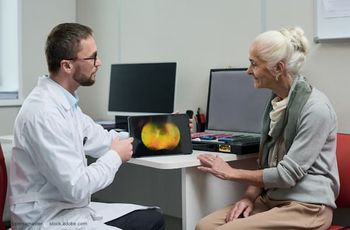
Q&A: Katherine Talcott, MD, on exploring a potential connection between autoimmune diseases and AMD
Katherine Talcott, a retina specialist at Cole Eye Institute at the Cleveland Clinic, presented at the Retinal World Congress 2025 meeting. In her presentation and in her conversation with Modern Retina, Talcott discussed the connection between autoimmune diseases and age-related macular degeneration (AMD), emphasizing the role of inflammation in AMD development.
The following conversation has been edited lightly for clarity.
Modern Retina: Can you share a bit about this study looking at the connection between autoimmune diseases and age-related macular degeneration?
Katherine Talcott, MD: Here at Retina World Congress, I'm presenting on is looking at the connection between autoimmune diseases and age-related macular degeneration (AMD), and we know that inflammation plays a role in the development of AMD, and especially with the approval of complement inhibitors for geographic atrophy (GA), we wondered if we could explore this connection a little bit. One of the things that we looked at is that, we actually did a large database study, to be able to look at the connection of patients who have autoimmune problems in AMD, and we actually found that for most autoimmune diseases, they have an increased risk of AMD compared to those people who don't. So we specifically, then, created sort of cohorts of patients, who had autoimmune diseases to see if they're more likely to present with AMD, including at different stages. And we actually found that this was the case for almost all the autoimmune diseases that we looked at. And so this was really a hypothesis-generating study that we did to explore this connection, but it raised almost more questions for us, which is, you know, are patients with autoimmune diseases, do they present with AMD at an earlier age? Do people who have more active autoimmune disease, do they have a more advanced form of AMD? So one of the things that we'll be sort of doing next is looking at, do patients with these diseases present with AMD at an earlier age? Can we look at this in our own database of our patients at Cleveland Clinic, and do they present with a different flavor of AMD than most people? So it's just interesting to, we think about inflammation related to aging, inflammaging, and so that just explored that relationship in our study.
MR: Can you share more about how this data was sourced?
Talcott: Our study was a de-identified database looking at sort of national hospital systems. So you get benefits from that, meaning that we were allowed to, we were able to create cohorts of thousands of patients to be able to answer these questions, but you're not able to verify individual patient-level data. So this was really hypothesis-generating. So looked at a sort of large de-identified database, and then we're going to be interested in looking at these same sorts of questions in our own patients. But obviously we're going to be limited by sort of how many patients we have with scleroderma or psoriasis, because that's obviously much smaller than you would get in a large national database.
MR: How might this research the future of how physicians and ophthalmologist look at AMD in the future?
Talcott: I think this really sort of drives home that inflammation is probably an important part of age-related macular degeneration, and that is not only just sort of age-related, but the inflammation piece as well. So some of the pearls that sort of, I've taken home from sort of doing this study is that maybe patients who have autoimmune diseases, we should screen more frequently for AMD. Maybe we should encourage that the rheumatologist or primary care doctor, whoever's taking care of them, might be more likely to get them plugged in to see ophthalmologists and to really sort of be looking for this. You know, you can imagine that in the future, you might want to put something like an OCT machine in a rheumatology office at a large academic center, just to be able to better screen for this. If you're seeing any changes in someone's retina who might have these conditions, you know, we normally don't think of it as, you know, person in their 50s as having drusin and as having AMD, but it could be AMD in these patients, so that's just something we'll need to explore a little bit more.
Newsletter
Keep your retina practice on the forefront—subscribe for expert analysis and emerging trends in retinal disease management.


































